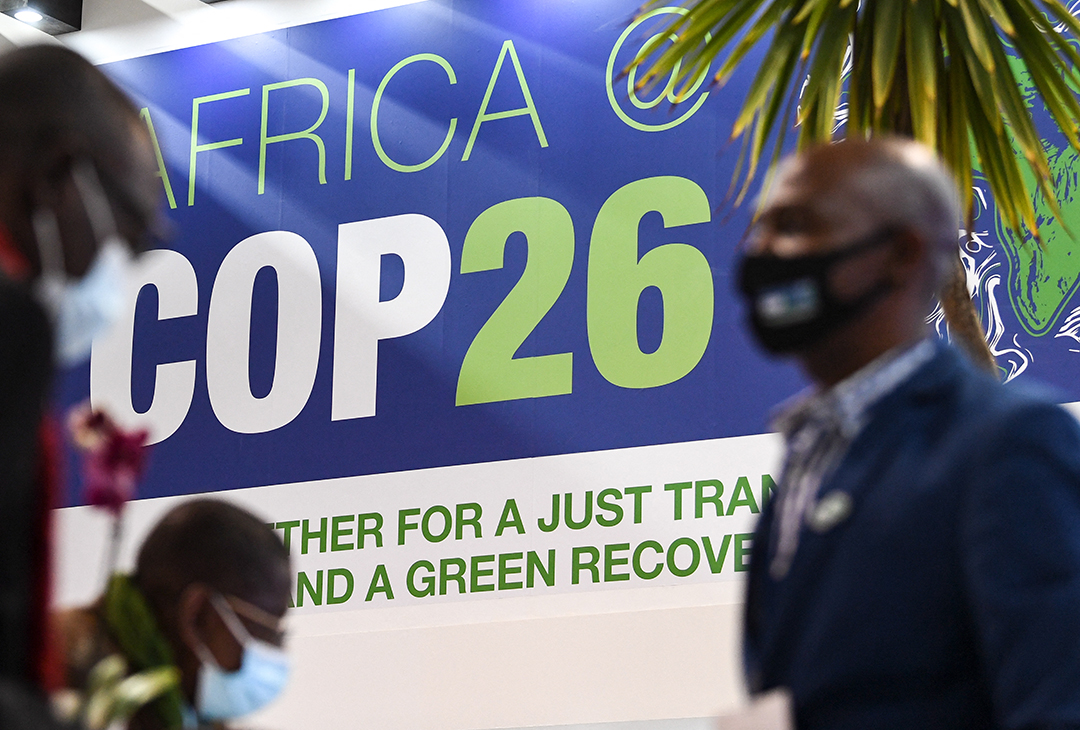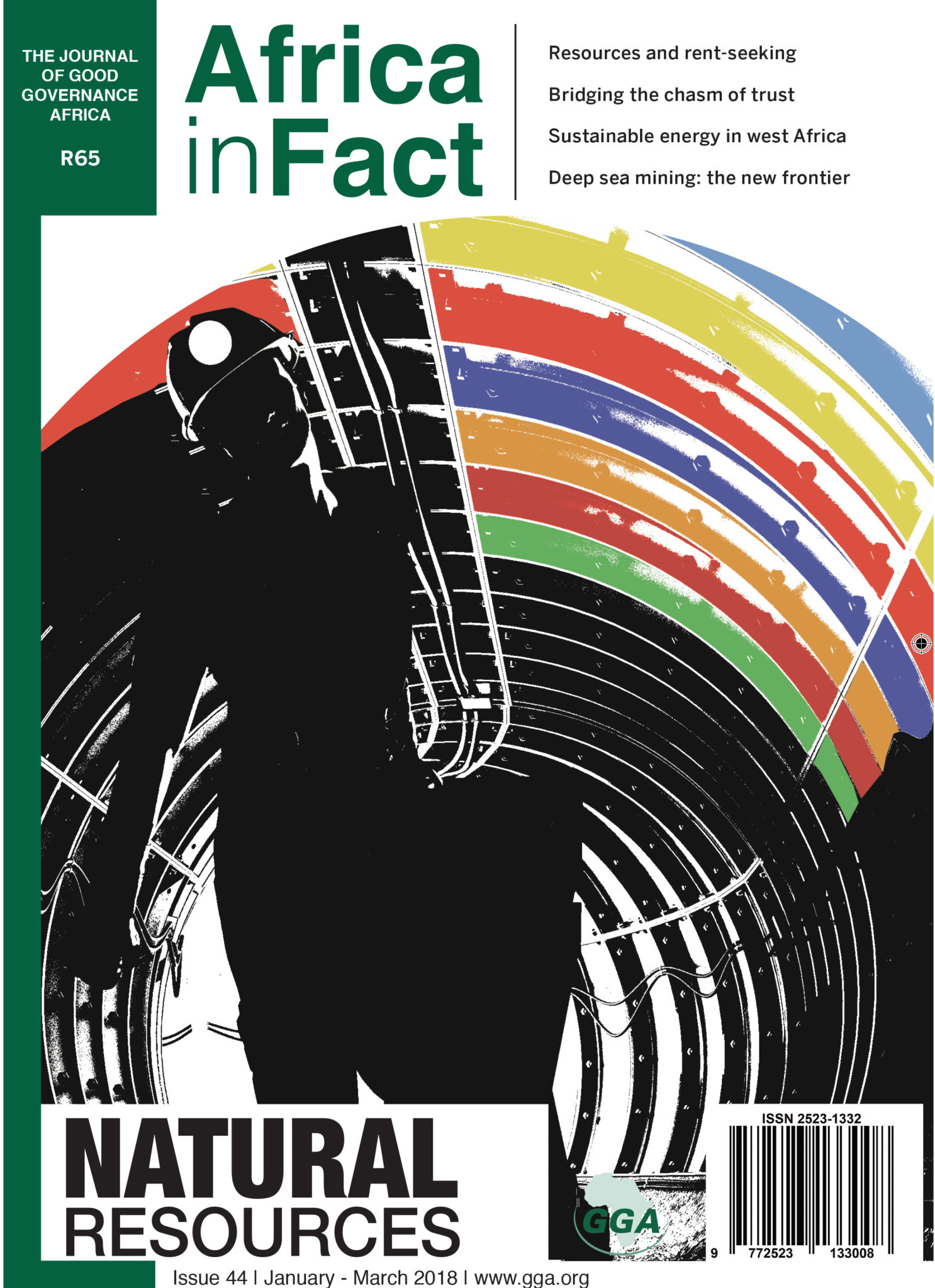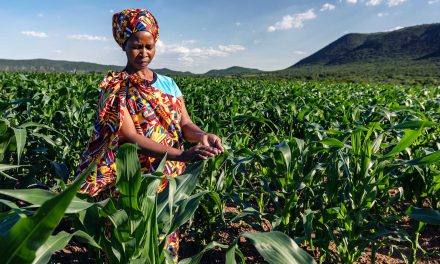
People stand by the Africa pavilion at the COP26 UN Climate Change Conference in Glasgow on November 2, 2021. Photo: Alain Jocard/AFP
On Monday 1 November, President Uhuru Kenyatta delivered Kenya’s national statement at the World Leaders Summit of the ongoing 26th United Nations Climate Conference (COP26). As a non-permanent member of the UN Security Council, he pledged Kenya would create a “compelling case for the nexus between climate change and security”, noting that the phenomenon was “escalating and complicating new and old conflicts throughout the world”.
While its role as a driver of conflict may seem self-evident, climate change has historically been framed as a developmental and/or environmental issue. Its inclusion on the UN Security Council’s agenda remains a topic of contention among member states. Moreover, the effects of climate change on international peace and security are often overlooked and neglected within security policy in general.
Nonetheless, the effects of climate change on peace and security are becoming increasingly clear, particularly in Africa, and can be broadly articulated as follows:
- Impacts on state security and stability, as a result of climate change generating or interacting with other higher-order security risks, such as conflict, major natural disasters, mass displacements of people, threats to critical resources and infrastructure, to name a few.
- Regional and interstate tensions and conflicts arising from the geopolitical impacts of climate change.
- Impacts of climate change on military and defence, such as direct impacts on military infrastructure, force readiness, military operations and military strategy.
The primary objective of COP26 is to encourage countries to take action to limit global temperature rise to 1.5 degrees above preindustrial levels, which is indeed the best long-run answer to addressing climate-related conflict and security risks. However, its impact on conflict and security trends are already a reality and will continue to shape the threat landscape in Africa, even if the most ambitious global carbon emissions targets are met. Increasing droughts and flooding in several regions on the continent, for example, has a direct bearing on food and water security, and potential to exacerbate or generate conflict.
It is therefore important that greater effort is made to model climate-related conflict and security risks, and integrate climate, peace, and security policy into early warning systems and assessments, as well as diplomacy, security and defence policies at the national and regional level across the continent.
The climate-security debate
The UN Security Council is by no means unaware of the adverse effects of climate change on peace and security. Many of the countries both on the Security Council’s agenda and in which UN multilateral peacekeepers are deployed are trapped in a negative feedback loop, where climate change undermines the ability to cope with conflict, and conflict undermines the state’s resilience capacity against climate change.
In Mali, for example, where large segments of the population are dependent on natural resources for their livelihoods, more erratic rainfall patterns and desertification are reshaping the country’s social, political, and economic context and creating new grievances and lines of marginalisation. This is exacerbating violent conflict and insecurity in northern and central Mali and challenging the successful implementation of the UN peacekeeping forces’ (MINUSMA) mandate to maintain peace and security.
Similar challenges are being faced by multilateral peacekeeping operations in South Sudan (UNMISS), the Central African Republic (MINUSCA), Somalia (AMISOM), and elsewhere on the continent.
Notwithstanding these realities, discussion of the link between climate change, conflict, and security risks at the Security Council has been hampered for a number of reasons.
First, despite progress made in recent years, the link between climate change and armed conflict is much less established in the academic literature then other key factors, such as resource scarcity, ethnic cleavages, a history of conflict, and the presence of weapons. However, the evidence connecting climate change effects to each of these variables is growing.
Second, some members argue that climate change is not within the mandate of the Security Council and delving into the issue would encroach on other UN Organs with more expertise on the topic.
Third, the Security Council commonly uses sanctions and can authorise the use of force to maintain or restore international peace and security under Article 24 of the UN Charter. If the link between climate change and conflict featured more prominently on the agenda, discussions around sanctioning the worst carbon emitters could arise. Security Council member states, particularly among the permanent five (China, France, Russia, the United Kingdom, the United States) likely wish to avoid this potential outcome given they are some of the world’s biggest emitters.
Progress made
Despite these tensions, President Kenyatta’s call for the Security Council to approach peace and security items with a greater sensitivity to the effects of climate change has gained traction in recent years.
Informal UN meetings (known as “Arria formula” meetings) on climate, peace, and security have been called by several UNSC member states, and climate-security threats are increasingly being incorporated into the UN’s conflict prevention, peacekeeping, and peace building work.
Since 2018, the UN has seen the establishment of a Climate-Security Mechanism (CSM) within its Secretariat, as well as the Group of Friends on Climate and Security and the Informal Expert Group of Members of the Security Council on Climate and Security to support the work of the UN system more broadly in addressing climate-related security risks.
Outside of the UN system, there has also been significant institutional and research development on the issue.
On 9 March 2021, the Peace and Security Council (PSC) of the African Union (AU) held the first meeting at the level of Heads of State and Government on climate-related security risks, under the title “Sustainable Peace in Africa: Climate Change and its Effects on Peace and Security on the Continent.” Among its recommendations, the PSC called on the AU to:
- Continue mobilising a united African front at the global level, in order to more effectively mitigate the negative effects of climate change at both national regional and continental levels, and for a Continental framework for proactively responding to the security threats posed by climate change related phenomena;
- [Encourage] the AU Commission to mainstream climate change in all its activities particularly in early warning and prevention of climate change related violent conflicts in the Continent and, in this regard, reiterates its request for the Continental Early Warning System to include in its regular briefings to Council, looming climate change-related security threats in the Continent.
Drawing on improvements in regional climate modelling and forecasting, there are a growing number of international research institutions looking at the linkages between climate and security in order to build a more complex and systemic understanding of associated risks and policy solutions.
Why it matters
Factoring climate change into early-warning systems, conflict resolution, mediation, and peace building efforts will help to mitigate climate-related conflict and security risks. It can also help to ensure adaptation and resilience initiatives do not inadvertently generate new tensions and violence, as has been the case in the Sahel and elsewhere.
For example, at the local level, this could entail government working with local actors to develop seasonal livestock herding routes to reduce tensions between farmers and herders or mediating between communities over contested access to water or land. At the regional level, this could entail developing treatises or other diplomatic efforts to reduce inter-state tensions arising from contested resources or increasing migration flows. And at the international level, this could mean ensuring a greater proportion of adaptation finance goes to fragile states as a form of conflict prevention rather than middle-income countries as is currently the case.
Security institutions will become increasingly overstretched as the frequency of extreme weather events increases, particularly where military personnel are used as first responders or where military infrastructure is directly impacted. It is therefore important that climate change is factored into force readiness assessments and related security planning, while new international law is needed to guide militaries and provide protection to civilians from the impacts of climate-security risks.
Security institutions could play a leading role in advocating for a reduction in global carbon emissions given the dire impacts of climate change on peace and security. Africa is the most vulnerable to climate-related conflict and security risks, and as such, the continents leaders’ should be at the forefront of advocating on the issue. Given the historical and current emissions by the five permanent members, it is incumbent upon the UN Security Council to take definitive action on the issue.
For more information on current conflict hotspots on the continent, and what is driving insecurity in these regions, visit our Conflict in Africa Monitor.
Stephen Buchanan-Clarke is a security analyst with several years' experience working in both conflict and post-conflict settings in Africa, primarily on issues of peace and security; transitional justice and reconciliation; democratisation and governance; and preventing and countering violent extremism. He currently serves as head of the Human Security and Climate Change (HSCC) project at Good Governance Africa and is a co-editor of the Extremisms in Africa anthology series.











